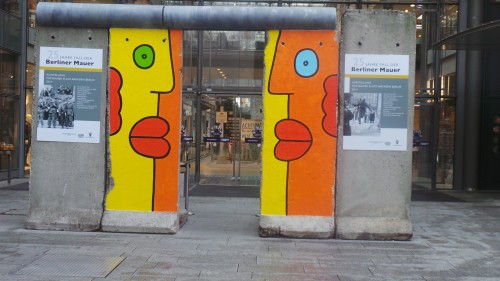On the 25th anniversary of the fall of the Berlin Wall, the most famous scientist in Germany - Chancellor Angela Merkel tells the participants of a conference at the Einstein Institute that opened in Berlin about the contribution of scientific progress in the West and the arrest in the East to the fall of the Wall

"On November 9, 1918, a German politician announced the creation of the new democratic nation of Germany. Twenty years later, on November 9, 1938, the Nazis destroyed synagogues and killed hundreds of Jews, and sent thousands more to concentration camps (Crystal Night, the event considered the beginning of the Holocaust - AB) and again on the same date - on November 9, 1989, the Berlin Wall fell and symbolically brought the end of the Cold War. No wonder the Germans organized many events on this day, from free concerts, exhibitions and fireworks. Germans will always remember November 9 as a day of great change.
Therefore, it is only fitting that the newly established Einstein Foundation in Berlin chose on this historic day to organize a group of academics to discuss the intellectual and cultural walls that also fell that day and the next walls that may be cracked, at a gathering known as "Falling Walls". Among the topics that came up at the gathering that took place before this date: the walls around understanding human evolution, the walls around our lives, the walls around our universe and the walls around our minds.
For readers of Scientific American, many of the hot spots are the same breakthroughs they've been reading about for years: findings of hominid fossils found in Africa that piece together the puzzle of human origins, brain implants that may one day allow humans to move artificial arms just by thinking about it; The completion of the Large Hadron Collider that will allow us to know the hidden universe.
But what is not known is how scientific progress, and the lack of it, contribute to historical events such as the spectacular fall of the Berlin Wall, at least according to the physicist who is no longer working in her role and became Chancellor of Germany - Angela Merkel. Despite her busy schedule, Markle asked to give a lecture to the conference participants: "People here have one way or another connection to the changes in my life," she said.
On November 9, 1989, the young Merkel, who was then working as a scientist, crossed the street and walked toward West Berlin. The move "changed her life" but did not dampen her love of science, she told the scientists.
In fact, the collapse of what was then the bipolar system of government is closer to science than anything else, she said. It was the scientific innovation that promoted the field of electronic communication, without which the people could not learn about the Western world and drive change. Scientific innovation also requires a critical mass of free-thinking people. These people often fled East Germany or were silenced by the regime, a process that led to its destruction, so it was difficult for the countries of the Eastern Bloc to move forward at the same pace," she said. In other words, they collapsed because they did not progress.

Indeed, progress is the central theme of the convention. Norbert Holakamp, Deputy Director ITER Organization talked about the progress in building a ship called a tokamak (tokamak vessel) that will be used for nuclear fusion research; The partners have already started building the parts. Martin Schwab, professor of neuroscience at ETH Zurich spoke about the potential to help paraplegics walk again; The clinical trials are underway and in which newly injured people receive an infusion of antibodies designed to block a protein that prevents the nerves from regenerating. Franz-Josef Ulm, a professor of environmental engineering at MIT talked about progress in developing cement concrete that emits only half the carbon emissions of the cement we use today.
Compared to the fallen walls, there were lecturers who talked about the walls that still exist. One barrier to scientific innovation is the reluctance of countries to cooperate in projects where they are required to lose part of their sovereignty. As an example, Merkel talked about the inability of countries to agree on a global plan to stop warming, and how strong nationalists interfered in the process of creating a united Europe. "The world will not be global if we do not enable global cooperation. These walls can fall. We must use globalization to talk about the walls of the unknown and think about how to bring them down." saying.
Merkel's identification with the theme of the conference did not come as a surprise. She grew up in the Democratic Republic of Germany and despite this she managed to win the love of the West Germans who elected her not long ago for a second term. She grew up in a world where governments were dominated by men and became Germany's first chancellor. I'm sure she feels at home when it comes to tearing down walls."

2 תגובות
Indeed, really healthy. You really have to murder all the murderers, then you have to murder all the murderers who murdered the murderers, then you have to murder all the murderers who murdered the murderers who murdered the murderers, and so on, and so we are left with no people at all. What a beauty.
The wall should have remained forever as a punishment for the German murderers. Shame how from a brutal aggressor they turned themselves into a victim. Just like their Arab allies in Israel. Who taught whom? To this day, they cry over the "wall" after they murdered tens of millions of people and a third of the Jewish people. Russia should have destroyed Germany to the ground, but it's never too late...